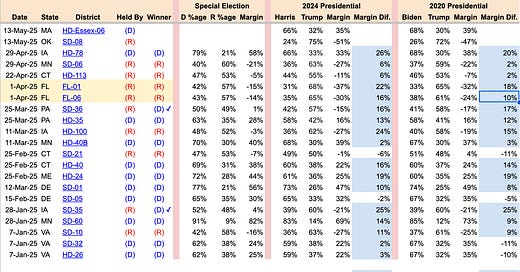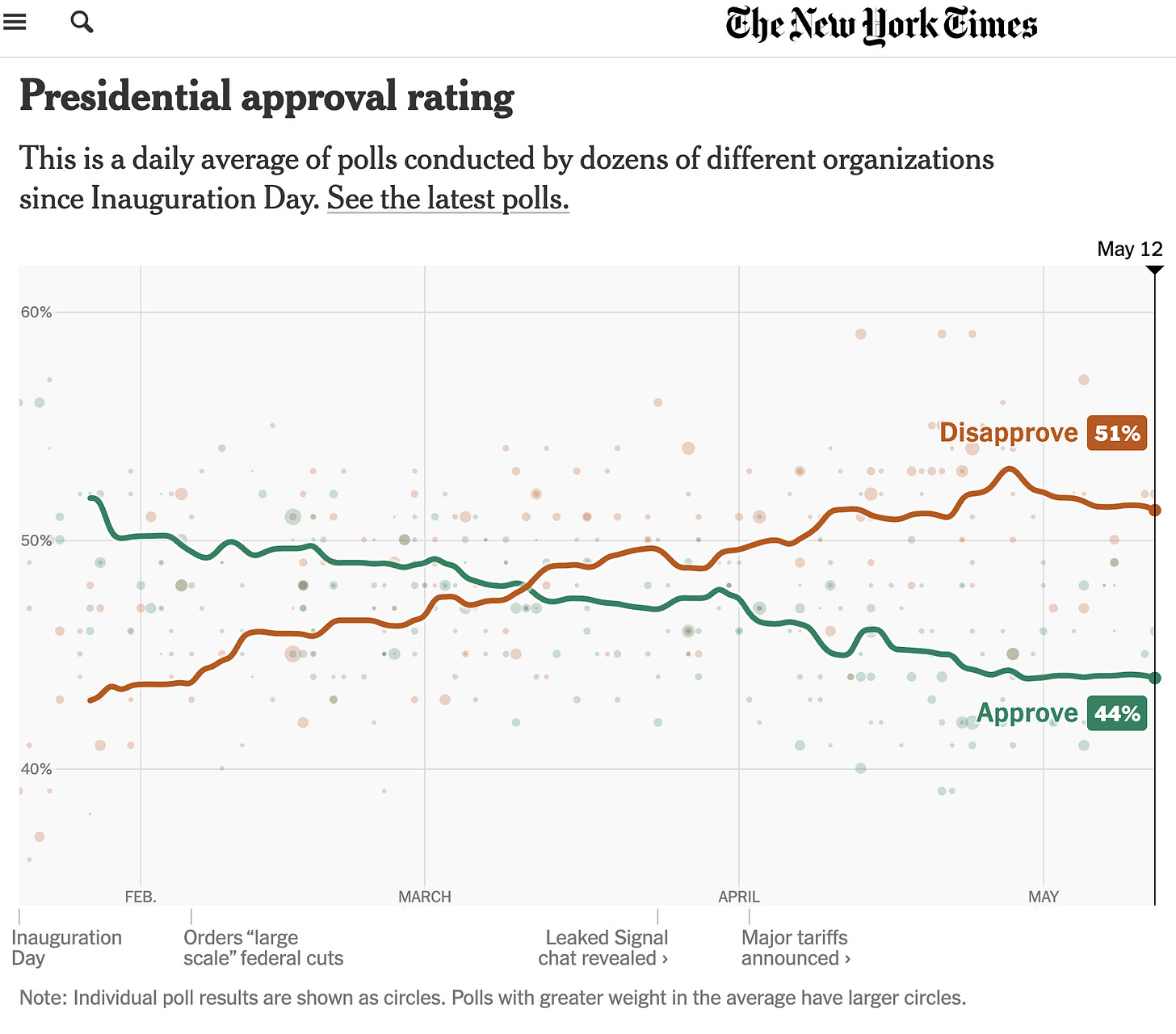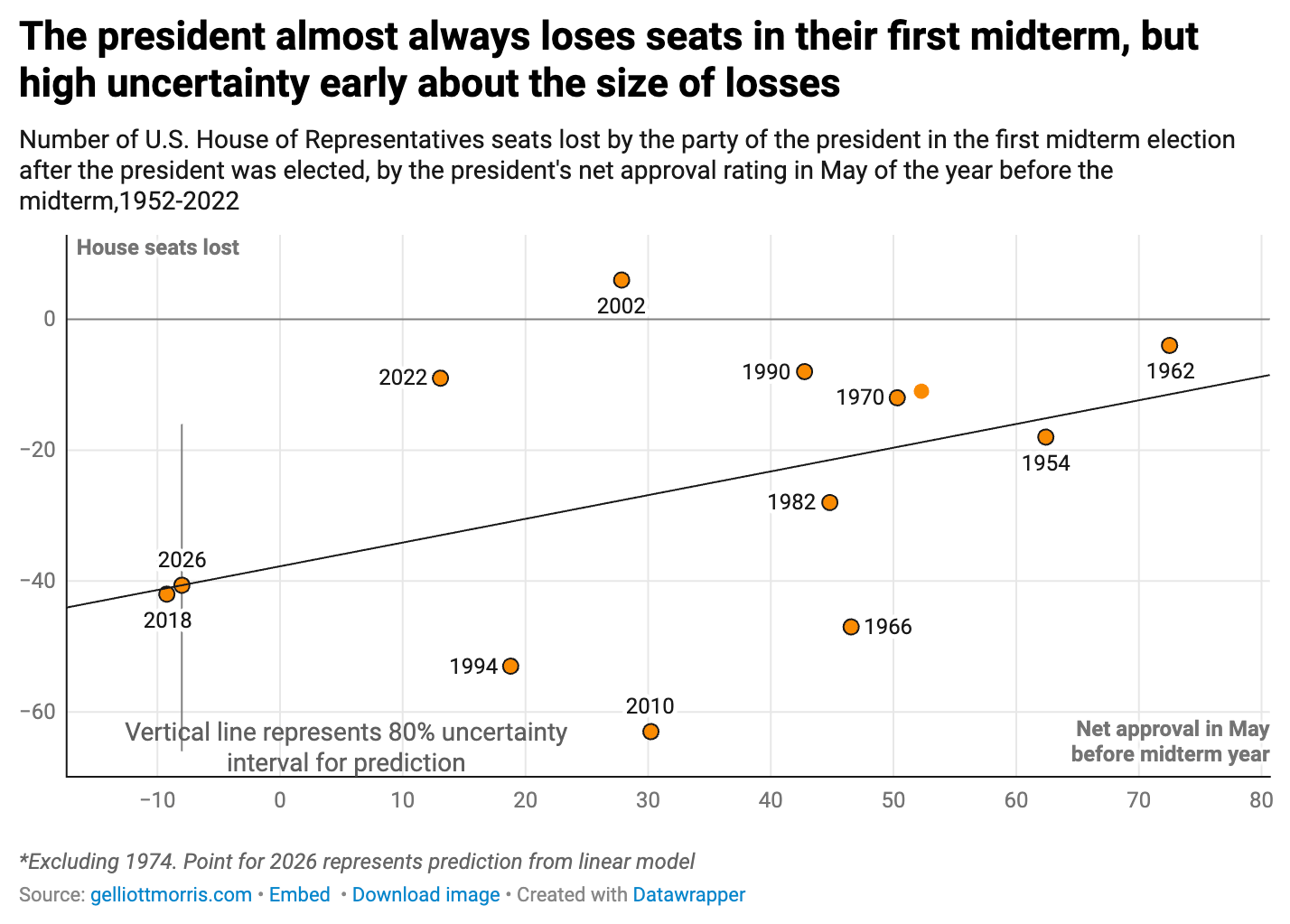Democrats have overperformed 2024 presidential margins in nearly every special and off-year election held in 2025. In the 19 special elections held this year through April, Democrats have overperformed their 2024 results by an average of 11.6 points. In only two of those races did the Democratic candidate do worse than the 2024 result. Both of those races were in Democratic states, and the difference was in single digits. On only one of those two seats did the Democrat lose and in that race it was by one point.
Source: The Downballot
The party has done particularly well in Iowa, having won a state senate race in a district that just a couple of months earlier went for Trump by 25 points. The latest special election was for a state house seat in Iowa that the Democrat over performed by 26 points. This was a district that voted for Harris by 33 points in 2024, so it is a safe Democratic seat. However, the Democratic candidate won by a 79-21 margin! While many people think Iowa is not a safe Republican state, there is more evidence that it remains fairly swingy. In the 2018 midterms, Democrats won three of the four Congressional districts and nearly beat Governor Kim Reynolds. Democrats are preparing to strongly contest those three districts again next year. And with Reynolds surprising retirement, state Auditor Rob Sand stands a good chance to win the governorship back for Democrats next year.
Reynolds’ surprise announcement that she would not run in 2026 is the latest in a string of candidate recruitment problems for Republicans. Former New Hampshire Governor Chris Sununu, who would have been a shoo-in for the nomination and likely the strongest general election candidate for the party, declined to run after Democratic Senator Jeanne Shaheen announced her retirement. It’s unclear whether Republicans can find anyone strong enough to compete with probable Democratic nominee Representative Chris Pappas. With Sununu on the ticket, the race probably would have leaned Republican, but without him it will be a Toss-Up at best. It’s still early, of course, but without Sununu and with a strong candidate like Pappas, this seat should be Lean or even Likely Democratic.
Source: Atlanta Journal Constitution
Another big loss for Republicans happened last week when Georgia Governor Brian Kemp announced he would not challenge Democratic Senator Jon Ossoff. Kemp was the only potential candidate beating Ossoff in the polling. Georgian Republicans are struggling to find a replacement before Representative Margery Taylor Greene announces what she is going to do. She has been losing to Ossoff by 17 points in the polling, but that won’t stop her from running if she wants to. She believes she can win the primary, and that’s all that will matter to her. However, she might run for governor. In Texas, habitual felon and Republican state Attorney General Ken Paxton is challenging incumbent Republican Senator John Cornyn. Paxton is way ahead of Cornyn in recent polling and, if he beats the incumbent, will likely make that race suddenly competitive for Democrats.
Regardless of the publicly-given reasons, whenever big name potential candidates refuse to run for a seat which they are almost certain to win their party’s nomination it is because they either do not think they can win or they think winning will be too difficult. In Kemp’s case, it may be that he wants to run for president in 2028 and running a 2026 Senate campaign doesn’t help him whether he wins or loses it. There is nothing stopping him from running for president in 2028 after winning a Senate seat in 2026, but it’s a difficult thing to get your constituents to accept. Losing a that Senate seat tells voters Kemp is unelectable nationally (regardless of whether that is true). Sununu is telling us he can’t win, in my opinion. And I think Reynolds bowing out is telling us that what we are seeing in Iowa special elections this year may be a real shift in the electorate. Maybe if she were not running for a third term she would take the risk, but she is likely telling us that Iowa will be contested next year up and and down the ballot.
One thing to watch next year is independent candidates running for Senate seats. Former union president Dan Osborn, who lost a Senate race as an independent last year, is running again – this time against Republican Pete Ricketts. In South Dakota, 2022 Democratic Senate nominee Brian Bengs is challenging Republican Senator Mike Rounds as an independent. Bengs claims that while campaigning around the state last time he heard many people tell him that they like him but would not vote for a Democrat. The party label has taken quite a hit everywhere since the November election. That has not stopped voters from supporting Democrats in special elections, but it is a problem in many largely rural Midwestern and Western states. Senator Bernie Sanders (I-VT) is encouraging candidates to run as independents where that makes the most sense, but he is also supporting Democrats where that makes the most sense.
Other states where independents might make strong runs for Senate or governor include Alaska, Montana, Iowa, Ohio, and Maine. In Maine, we are still waiting for Senator Susan Collins (R) to announce whether she will run for another term. Maine already has one independent Senator – who was previously the state’s independent governor – and Representative Jared Golden (D) has floated the possibility he might run for either Senate or governor as an independent.
On paper, things don’t look good for Democrats to win the Senate. There are only two seemingly plausible pick-up states: Maine and North Carolina. In addition they have to hold onto seats in two states Trump won (Georgia and Michigan) and another that could be competitive (Minnesota). Democrats need to win a net of four seats to take the Senate. However, 2026 looks to be another year that Republicans may snatch defeat from the jaws of victory.
Source: New York Times Poll Tracker
As noted above, they are having a difficult time with candidate recruitment. Trump’s poll numbers are worse than any other president at this point in his term except for Trump himself in 2017, and they are not getting better. In fact, his polling on the economy continues to get worse than his overall approval rating, which is a bad thing for any president, but an especially bad thing for this one. Congressional Republicans have thus far doubled-down on Trump’s unpopular policies rather than distancing themselves from them. In a mid-term like this one (this one is more analogous to a first term mid-term than a second term mid-term, even though this is technically Trump’s second term), low presidential approval numbers tend to sink that party’s Congressional chances. Embracing Trump’s failures might do even more damage to Republicans next year – which is why there is still a good chance we will see some of them attempt to show some daylight between themselves and Trump.
Source: Strength in Numbers
Polling analyst G. Elliott Morris thinks that based on historical trends, Trump’s current approval numbers are likely to cost Republicans about 40 seats in the House and, if they get much worse, put the Texas and Florida Senate seats into play. My guess is that if Sherrod Brown runs in Ohio, this “much worse” scenario would put Ohio into play as well. While Texas is constantly threatening to turn blue, Florida seems to be getting more solidly Republican. With Paxton as the GOP nominee in Texas, it may not take any additional dips to Trump’s approvals to put that state into play. But in a normal year Florida looks like a +10 Republican state now. Maybe I am wrong, but at the moment I don’t see any strong Democratic Senate candidates emerging from the Sunshine State. Collin Allen and Beto O’Rourke – both widely known to general election audiences in Texas – are considering Senate runs in the Lone Star State. Retired astronaut and Air Force colonel Terry Virts is expected to announce his candidacy for the Democratic nomination soon.
As Morris notes, Trump’s approval numbers are not likely to get much better between now and November 2026, but they could get worse. As Trump retreats from his nonsensical tariff policy while declaring victory, we’ll see if economic instability hurts him further (or if recovering some stability helps him). When the fall comes, views of the president and Congress will start to harden among voters. Without Trump on the ballot and with Democrats now being the party of high-propensity voters (and thus showing up in greater numbers in non-presidential elections), Republicans are right to be nervous about their chances next year.






